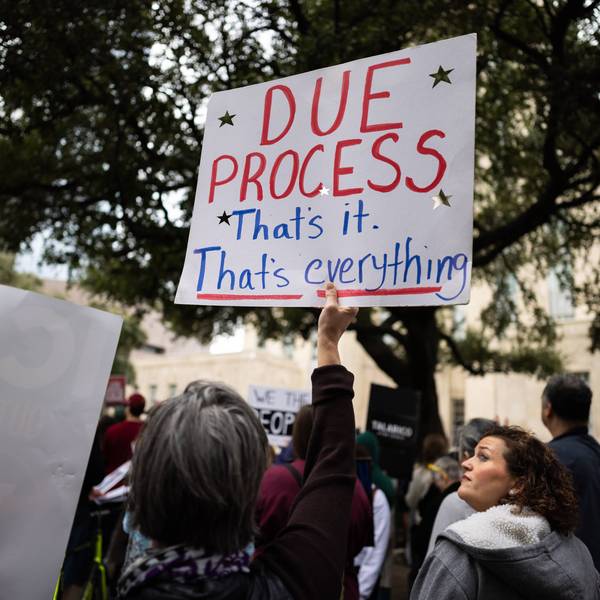The common U.S. practice of stripping the franchise from people with criminal convictions leaves the country "out of step with the rest of the world," according to a report published Thursday by the Sentencing Project, Human Rights Watch, and the ACLU.
Despite recent progress in some states, the groups estimated that more than 4.4 million U.S. residents were disenfranchised because of a felony conviction as of 2022, and "thousands more eligible voters were unable to cast their ballot because they were in prison."
"The states with the most restrictive disenfranchisement laws are those with the highest percentages of Black and Latinx people," the new report notes. "Eleven U.S. states permanently disenfranchise at least some people with felony convictions for the rest of their lives. Fourteen U.S. states disenfranchise people both for the duration of their prison sentence and, upon their return to the community, during the time they are under parole or felony probation supervision. An additional state, Louisiana, restores voting rights to people on felony probation and parole once they have been out of prison for five years or more."
"Twenty-three states restore voting rights to people when they return to the community from prison," the report adds, "although at least four states that otherwise restore voting rights after a felony conviction permanently disenfranchise residents for certain election practices."
The 55-page analysis places U.S. disenfranchisement laws alongside the practices of 136 other countries with populations over 1.5 million people and concludes that the U.S.—with its "punitive criminal legal system" and high incarceration rates—is an "outlier nation."
"Wide access to voting is a cornerstone of rights-respecting, democratic government."
More than half of the countries examined in the report "never or rarely deny a person's right to vote because of a conviction." When placed among the remaining countries "where laws deny the right in broader sets of circumstances," the report states, "the U.S. is toward the restrictive end of the spectrum and disenfranchises, largely through U.S. state law, a wider swath of people on the whole."
"In five countries—the Republic of the Congo, Côte d’Ivoire, Madagascar, Morocco, and Togo—people whose convictions fall in certain categories are disenfranchised permanently," the report observes. "These five countries are in the same category with the 11 U.S. states that permanently disenfranchise at least some people convicted of felonies."
Alison Leal Parker, deputy U.S. director at Human Rights Watch, said in a statement that "wide access to voting is a cornerstone of rights-respecting, democratic government, which is why the right to vote is protected in international human rights law and why the U.S. should reform its outlier status on voting rights."
"The right to vote, and the legitimacy of the democratic system in the United States, should not depend on its criminal legal system, which is built upon and perpetuates discrimination," said Parker.
While a number of states have moved in recent years to loosen voting restrictions for people with felony convictions and restore the franchise at the time of a person's release from incarceration, just four U.S. jurisdictions—Vermont, Maine, Puerto Rico, and Washington, D.C.—allow people to vote while they are imprisoned.
Late last year, Rep. Ayanna Pressley (D-Mass.) and Sen. Peter Welch (D-Vt.) introduced legislation that would guarantee voting rights to incarcerated citizens and end felony disenfranchisement in federal elections. The bill has just five cosponsors in the Senate and 25 in the House, even though polling data has shown a majority of Americans support guaranteeing voting rights to all, including incarcerated people.
The new report calls on the United States to "end felony disenfranchisement and extend voting rights to all otherwise voting-eligible persons without regard to their criminal legal system contact or convictions." It also recommends that the country eliminate all requirements that citizens pay court-related fines before being allowed to vote again—a practice the report calls a "modern-day poll tax."
"In the United States, this policy is rooted in historical practices intended to reduce electoral participation of citizens of color who would otherwise be eligible to vote," the human rights groups wrote.
Jonathan Topaz, a staff attorney with the ACLU's Voting Rights Project, said Thursday that "even as we've seen more U.S. states make progress in expanding rights restoration, there remain substantial challenges to voter access."
"Convoluted rights restoration laws have resulted in voter confusion about eligibility among returning citizens," said Topaz "Additionally, in many states, returning citizens become eligible to vote only upon payment of various legal financial obligations such as fees, costs, fines, and/or restitution, which essentially institutes a pay-to-vote system. These obstacles must be abolished to ensure full civic participation."




